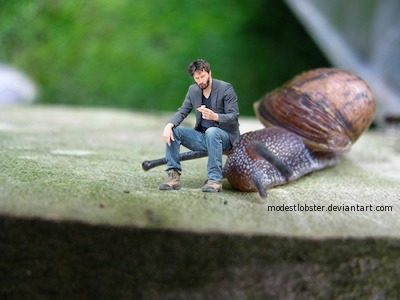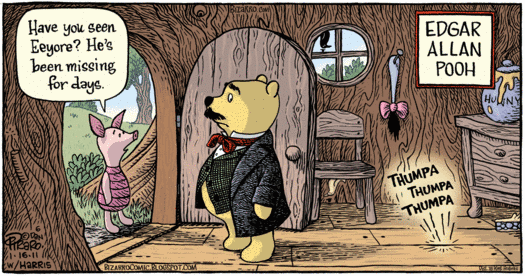Category: Culture
Coffee Out the Nose Funny: David Thorne’s American snow trip adventure
There are very few things in this world that are genuinely laugh out loud funny when you’re reading them in your head. David Thorne’s delightfully nasty bits of revenge, posted online for the world to see, are up there with the best of them.
David went to a ski shop in the US. The service was less than adequate. The gloves he purchased, that he was assured were waterproof, were not. They got wet, and the black ink that provided their ebony colour ran. And it ran all over his jumper. And when he went back to exchange them the staff abused him. So this is what he did:

The store received 5,000 calls enquiring about the free snowboard. And this email exchange ensued.
It was at this point in the exchange that coffee shot through my nostrils:
“I should probably be thankful that your staff were too occupied with having their earlobes stretched by Tonka-truck tyres and wearing pants around their knees to sell me a snowsurfingboard made of sugar or goggles made of bees.”
Or perhaps this point:
“Also, I apologise. While the average male height of 5″9 statistically means anything under is considered short, my question was without diminutive intention. I’m sure there are many advantages to being so small. Target carries an excellent range of boys clothing at competitive prices and a lower centre of gravity should, once helped up onto the ski-lift, allow you to snowboardsurf with greater stability. If I were small, I would buy a cat and ride it.”
There is, as is often the case with Thorne’s work, a language warning attached. It didn’t end all that well. Thorne punctuated the exchange with this:

What do you get if you combine the Matrix, Transformers, Terminator and Voltron?
Answer: Something like this:
Tumblrweed: White People Rapping Badly
Your weekly single serving tumblog is White People Rapping Badly. Pretty self explanatory – and if you can stomach these you should check it out.
“Science has show that for every Eminem, there are approximately 598,467 white people that try to rap but can’t. This is devoted to bringing you the best of the worst.”
Data auralisation: Music is my train station
Alexander Chen is working on a project turning those train route maps you see all around the world into a musical instrument.
Watch the demo:
Conductor (Interactive instrument in progress) from Alexander Chen on Vimeo.
He has set them up so that the train schedules, and intersections determine the order the notes are played in, and how frequently, which is a pretty nifty piece of data visualisation, or perhaps actualisation, or auralisation…
Real Life Fruit Ninja
A couple of rude words in this. But it’s funny.
Don’t play with knives people. Don’t do it.
Build your own horoscope
It turns out writing horoscopes is really, really, easy.
Information is Beautiful posted this great breakdown/wordcloud from 4,000 horoscopes.

It can’t be too hard to string a sentence together with a few prominent words. So write one in the comments, here’s mine:
“You will sure feel better if you use your mind”
Axe Cop: “A” for Awesome
Axe Cop is a web comic written by a six year old (it started when he was five) and illustrated by his much older brother. Very cute idea. It features a regular “Ask Axe Cop” feature that I’ve enjoyed reading.

It’s now a book Amazon Link.
Got any other webcomics I should be reading?
Slow photography
A while back, somewhere or other (I found it, I found it), Arthur linked to this slow blog manifesto. I read it. I thought about it. I rejected it. Mostly because slow blogging here would bore me, and I hope you. And you’d fall asleep. Fall out a window. And die. And I don’t want that (though if you want a slow blog check out Venn Theology).
But I do like the idea of thinking about what you’re doing and why. And I think less is more is a good rule of thumb – if not one I’m buying into here. I have limited time to blog the whole internet and publish it as a book before the Internet disappears.
As a photographer, I have a tendency to shoot, and shoot and shoot. It wasn’t uncommon during our tour of Greece and Turkey for me to finish a day with over a thousand pictures. And plenty of them were of the same thing as I fiddled with camera settings. This means editing. Lots of it.
So I’m a fan of this “slow photography” concept:
“For most people, including me, photography is most often about documentation or record-keeping. It is about taking a photograph as an effort to grab a moment as it rushes by, to stage a tiny revolt against the tyranny of time. That’s why traditionally we photograph at moments you might think of as scarce. Few people photograph their daily commute, but most of us only go to high-school prom once—or maybe twice. A baby soon becomes a child, but humans look vaguely middle-aged for decades.”
Slow photography is about moving on from trying to record everything (which is my approach here) to trying to create beauty. Which is what I’m after when I take photos.
“The difference between documentation and the beauty impulse is that the latter has the power to produce not just a memory, but an emotional response in any viewer. That’s very different from the impulse to record. For group pictures are never beautiful, nor are photos in front of the Eiffel Tower. (It is big, and the subject is too small.)”
What this looks like is a three step process (according to that article – which elaborates on these points):
Step 1 in slow photography is spending a long time studying the subject.
Step 2 is the exercise of creative choices—the greatest pleasure that our automatic cameras rob us of.
Step 3 is playing around in post-production, whether in a darkroom or using photo-editing tools
Here’s a photo I took that maybe falls into that category…
Straight as an arrow
Recipe for awesome video:
Small camera.
Bow and arrow.
Sticky tape.
Combine, press record, and fire.
Would be better with good sound, but beggars can’t be choosers.
Tumblrweed: Sad Keanu
Sad Keanu is one of my favourite memes. Did you know there’s a tumblog dedicated to photoshopped Keanu images? No. Well. Now you do.

There’s also this interview with Keanu where has has a little chat about the meme (see 3.24, via Time).
Baltimore’s Police Chief on The Wire: “I don’t like you”
The Wire is a gritty police drama focused on the city of Baltimore. It doesn’t really depict the police institution in the most flattering light.
David Simon, the director of The Wire responded, and I think we can all say “oh snap”…
Others might reasonably argue, however that it is not sixty hours of The Wire that will require decades for our city to overcome, as the commissioner claims. A more lingering problem might be two decades of bad performance by a police agency more obsessed with statistics than substance, with appeasing political leadership rather than seriously addressing the roots of city violence, with shifting blame rather than taking responsibility.
Coming soon, Obama’s views on how the West Wing makes the presidency glamourous.
Via 22 Words.


